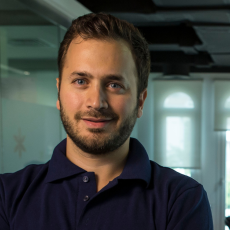What sparked the idea of creating a company like Derq and how are your solutions improving road traffic?
Derq was started in collaboration with two co-founders, leveraging my PhD thesis at MIT, with the goal to integrate autonomous technology capabilities in city traffic applications. Seeing how the vehicles are becoming increasingly smart and AI powered, we sensed an opportunity in extending the same degree of intelligence into the road infrastructure per se. As a result, by the end of 2016, we felt it was the right time to bring to the market our algorithms and solutions, given that we had something solid to build upon thanks to the issue of the patent that I had been previously filing at MIT. In a nutshell, we created Derq to make the future of transportation safer, more intelligent and autonomous ready.

The core of our solutions is an AI platform which uses video or radar feeds to obtain data that is converted into important insights that help us understand historical patterns, detect dangerous events in real time, and predict future behaviors.
Derq Insight is using existing traffic cameras to generate predictions in relation to the potential time of a future crash, the detection of crash hotspots and the identification of pedestrians who are jaywalking. Derq Sense is a collision avoidance solution that communicates the insights to different end users, and is able to offer real-time control feedback to the traffic lights so they can extend the green light for a pedestrian to cross, for example.
How are you gathering and exploiting all this data to make the roads safer through your platform?
The road agencies (and, eventually, the automotive companies) that are buying our solutions give us access to their camera feeds, and we then deploy our software either on the cloud or inside the traffic light via a controller box. Although the software is pre-trained on the data collected in prior instances, we are taking up to two weeks to fine tune and adapt the model to the specific circumstances required. We are not using huge amounts of data, the process is quick and fully automated, and once the system is live, it keeps on learning. Besides detecting events, we are providing the cities with a greater added value in also predicting crashes by identifying the areas with vulnerabilities and helping them prioritize safety measures. For instance, 40% of crashes are happening around intersections due mainly to red light running, and while deterministic approaches lead to some predictions, this method is also ridden with many false alarms. Real-time collision avoidance can be obtained only through accurate observations which are best achieved with the help of machine learning. At Derq, we managed to predict crashes with 95% accuracy, and two seconds in advance.
How is the market reacting to your products?
We initially launched the precursor of Derq Sense and, while well received, we realized we cannot deploy it at scale in the short term due to external factors that we cannot control. In the case of autonomous cars, for example, our customers are waiting for clearer standards and mandates to be able to adopt such a solution. Nevertheless, we sparked interest in the traffic lights space and, so, we re-converted our offer and created Derq Insight, which is very popular now and brings us most of the revenue. As a result, we plan to expand on its success and create a future-proof platform where we can integrate the insights into connected vehicles, once the market is mature enough to accept them.
What are the challenges that you would have to overcome for your solutions to be available worldwide?
Little by little, the world is moving towards the adoption phase of intelligent intersections and given that these technologies have already been proven to be accurate and efficient, it is a question of when not a question of if it will happen. AI embedded roads are becoming a reality similarly to how cameras and sensors became a prerequisite in vehicles. However, this transition will take time, and for it to happen in an accelerated manner we need investment and support both from public and private entities. Derq was founded with the purpose to save as many human lives as possible and while technology is a highly intriguing element of what we are doing, ultimately, we are still pushed forward by the wish to have a positive impact on the world. As a startup, we have a lot of weight to carry and this is why our employees need to be equally dedicated to the end goal.





